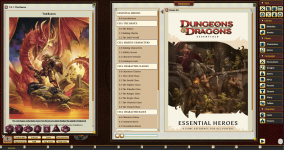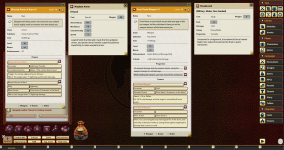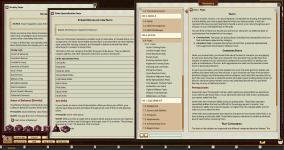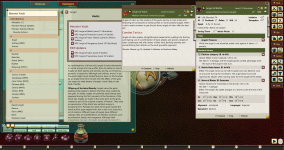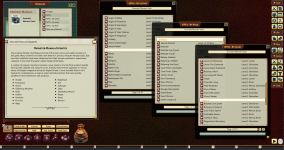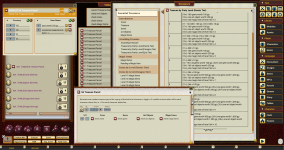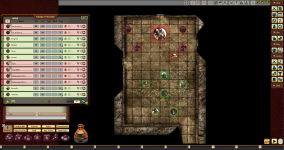You are using an out of date browser. It may not display this or other websites correctly.
You should upgrade or use an alternative browser.
You should upgrade or use an alternative browser.
D&D 4E D&D 4E fans: what do you like about 4E?
- Thread starter overgeeked
- Start date
roger semerad
Adventurer
1: Attacker always rolls - Out of all the things that we lost in 5th, this is the one that really angered me the most. I understand most of the other changes in 5th are a matter of personal opinion, so those I don't get mad at, but attackers always roll is just an objectively better way to do things. I compare it directly to the Thac0 to BAB change. Both basically leave the math completely unchanged, while making them easier to understand, use, and teach. It's a small thing to focus on, but that's also part of why I'm so mad at it going away. For what reason did the designers go back to the old way? Did attackers always role just have too much 4th stink on it? It's the only reason I can think of. Okay, Okay, that will be the last angry thing I'll say, I'll keep the rest of my post focused just on what I love about 4th. I just had to get that off my chest.
2: Fun tactical combat - I love how the battlefield, positioning, teamwork, and movement all really matter. Fights in 4th are dynamic things and I love it.
3: The background lore - I'm continuously fascinated by the lore found in 4th edition books. They always get me thinking about the possibilities in the world. I even think the Wizard's Presents World Preview book is one of the best worldbuilding books ever written. You don't often hear about the creative process behind why the world and mythology are the way they are. It's a great resource.
4: Plenty of choice with PCs - There is so much design space in 4th to make the character you want that it's amazing it's still a class based system. In no other version of D&D have I had so much fun comming up with a weird concept. There always seems to be a way to make anything in 4th, no matter how much you deviate from the classic class identities. Not only make, but have the way you act on a mechanical level also reflect that concept.
5: Ritual Casting - I love separating the combat and noncombat spells. It gives both more design space by not having them compete with each other. I also love that a non spellcasting class can pick up ritual casting if they want. It also really works with the way I always thought of magic in fiction. That ritual processes and magic reagents can help you conjure more powerful effects than what you can do on the spot. Casting a spell in seconds with your own magical energy requires a ton of practice to pull off, and mages can only fast cast a few spells that they've practiced to death. So if you want a quick combat spell, that's the thing to practice, but if you want to pull off a spell tailored to the problem at hand, that's when you have to do it ritually.
A bunch of other things too, but I think those are the big ones for me. 4th may not be completely perfect, but it's about as close as it can get for me.
2: Fun tactical combat - I love how the battlefield, positioning, teamwork, and movement all really matter. Fights in 4th are dynamic things and I love it.
3: The background lore - I'm continuously fascinated by the lore found in 4th edition books. They always get me thinking about the possibilities in the world. I even think the Wizard's Presents World Preview book is one of the best worldbuilding books ever written. You don't often hear about the creative process behind why the world and mythology are the way they are. It's a great resource.
4: Plenty of choice with PCs - There is so much design space in 4th to make the character you want that it's amazing it's still a class based system. In no other version of D&D have I had so much fun comming up with a weird concept. There always seems to be a way to make anything in 4th, no matter how much you deviate from the classic class identities. Not only make, but have the way you act on a mechanical level also reflect that concept.
5: Ritual Casting - I love separating the combat and noncombat spells. It gives both more design space by not having them compete with each other. I also love that a non spellcasting class can pick up ritual casting if they want. It also really works with the way I always thought of magic in fiction. That ritual processes and magic reagents can help you conjure more powerful effects than what you can do on the spot. Casting a spell in seconds with your own magical energy requires a ton of practice to pull off, and mages can only fast cast a few spells that they've practiced to death. So if you want a quick combat spell, that's the thing to practice, but if you want to pull off a spell tailored to the problem at hand, that's when you have to do it ritually.
A bunch of other things too, but I think those are the big ones for me. 4th may not be completely perfect, but it's about as close as it can get for me.
doctorbadwolf
Heretic of The Seventh Circle
The lore was the best D&D has ever had IMO.
Non armor defenses added some subtle dynamics like monks mostly attacking NADs, etc.
Essentials classes added a lot more freedom to the game overall, and brought some of my friends back in.
The Assassin. Technically underpowered? Sure. Still fun as hell tho.
Warlock Pacts, Themes, Paragon Paths, Epic Destinies, all had tons and tons of flavor to hinge a character on.
Rituals…I miss rituals. 5e spells with the ritual tag are not it. Better than nothing, but still very much lacking.
While I don’t miss all the stacking attack and damage bonuses, I do miss being able to stack class feature, power, magic item, and feat, to turn a 3 square teleport into a 7 square teleport, or turn a 2 square forced movement into 5 squares, etc.
Monsters/encounter design was top notch. I’ve yet to see any crunchy TTRPG that does it as well as 4e D&D.
Related to the above, skill challenges could be integrated seamlessly into combat encounters, because they both worked on a turn by turn basis, with some sort of action each turn. Factor in hazards, and the possibilities are truly magnificent.
Daily powers and the “until the end of the encounter” concept allowed for very interesting stuff like Bard songs that helped the team for the entire fight, but weren’t spammable. (I’d still kinda prefer it if you can use X daily powers per day, and if you want to use the same one all day that’s fine)
Spellcasters having implements, and the ability to specialize in a type of implement, and feats like the one that let you dual wield implements and gain extra damage or whatever. Eventually they added Tome implements and I was very happy. Let me use my spellbook to cast my spells!
Clear main stat for every PC, with attacks by main stat.
Magic items could be used as a “magic mart” deal, be up to the DM, not be featured at all with inherent bonuses, or some combination or mid-point, and you could have the same items just level up and stay mathematically relevant by upgrading to the level XYZ version of the same item.
Alchemy. Like rituals, it was a solid system and a robust set of options.
The eventual state of the ranger was very good. I disliked the mundane ranger, but once I could grab primal utility spells, and some of the later ranger powers were a little less strongly bound to being martial in effects, I loved it. The still dropped the ball on the beast subclass.
Rogues and warlocks kicked ass all over.
Swordmage, Warlord, Warden, Seeker, Avengers, are all awesome additions.
I liked wizards and fighters and paladins for the first time.
The races all had very solid, interesting, compelling, lore, and aesthetics.
Non armor defenses added some subtle dynamics like monks mostly attacking NADs, etc.
Essentials classes added a lot more freedom to the game overall, and brought some of my friends back in.
The Assassin. Technically underpowered? Sure. Still fun as hell tho.
Warlock Pacts, Themes, Paragon Paths, Epic Destinies, all had tons and tons of flavor to hinge a character on.
Rituals…I miss rituals. 5e spells with the ritual tag are not it. Better than nothing, but still very much lacking.
While I don’t miss all the stacking attack and damage bonuses, I do miss being able to stack class feature, power, magic item, and feat, to turn a 3 square teleport into a 7 square teleport, or turn a 2 square forced movement into 5 squares, etc.
Monsters/encounter design was top notch. I’ve yet to see any crunchy TTRPG that does it as well as 4e D&D.
Related to the above, skill challenges could be integrated seamlessly into combat encounters, because they both worked on a turn by turn basis, with some sort of action each turn. Factor in hazards, and the possibilities are truly magnificent.
Daily powers and the “until the end of the encounter” concept allowed for very interesting stuff like Bard songs that helped the team for the entire fight, but weren’t spammable. (I’d still kinda prefer it if you can use X daily powers per day, and if you want to use the same one all day that’s fine)
Spellcasters having implements, and the ability to specialize in a type of implement, and feats like the one that let you dual wield implements and gain extra damage or whatever. Eventually they added Tome implements and I was very happy. Let me use my spellbook to cast my spells!
Clear main stat for every PC, with attacks by main stat.
Magic items could be used as a “magic mart” deal, be up to the DM, not be featured at all with inherent bonuses, or some combination or mid-point, and you could have the same items just level up and stay mathematically relevant by upgrading to the level XYZ version of the same item.
Alchemy. Like rituals, it was a solid system and a robust set of options.
The eventual state of the ranger was very good. I disliked the mundane ranger, but once I could grab primal utility spells, and some of the later ranger powers were a little less strongly bound to being martial in effects, I loved it. The still dropped the ball on the beast subclass.
Rogues and warlocks kicked ass all over.
Swordmage, Warlord, Warden, Seeker, Avengers, are all awesome additions.
I liked wizards and fighters and paladins for the first time.
The races all had very solid, interesting, compelling, lore, and aesthetics.
There is a mechanical difference – or rather, making it different creates a mechanical difference. It is usually pretty easy to get a few points of attack bonus from things like Combat Advantage or Bless, or Inspiration in 5e. It is significantly harder to give opponents save penalties and/or increase one's save DC. Whether that's a good or a bad thing is a matter of taste, but it is a thing.1: Attacker always rolls - Out of all the things that we lost in 5th, this is the one that really angered me the most. I understand most of the other changes in 5th are a matter of personal opinion, so those I don't get mad at, but attackers always roll is just an objectively better way to do things. I compare it directly to the Thac0 to BAB change. Both basically leave the math completely unchanged, while making them easier to understand, use, and teach. It's a small thing to focus on, but that's also part of why I'm so mad at it going away. For what reason did the designers go back to the old way? Did attackers always role just have too much 4th stink on it? It's the only reason I can think of. Okay, Okay, that will be the last angry thing I'll say, I'll keep the rest of my post focused just on what I love about 4th. I just had to get that off my chest.
The Grinning Frog
Game Publishers
Can I just say 'all of the above'. Gods, I feel like the odd man out so often when it comes to 4e. I LOVE 4e. It is my favourite RPG system and I think I'm in agreement with everything above. (So to read all the replies above makes me so happy.) My two favourite mechanics + one other point:
1) Blooded*
2) The four defence categories**
3) Save ends***
*Easy to describe to players so they know they are making progress in a fight, great to use as a trigger point for something funky to happen
**You can describe the creature, and then the players can make a tactical decision about how to attack it backed on the description. This is a beautiful thing and makes for such wonderful roleplay potentials. Removing that was criminal.
***As a writer and publisher of 3rd party content for 5e can I just say 'wtf is wrong with the overly worded descriptions in stat blocks?' (I am so sick of using the long formats). Save ends was obvious, intuitive and well within the grasp of a player to remember.
I know this is about 4e but I would like to say that the writing direction in 5e is as if they assume the players are numpties who won't remember a damned thing. I find it an eternal frustration, and indeed, is one of the reasons so much of my work is system-neutral.
1) Blooded*
2) The four defence categories**
3) Save ends***
*Easy to describe to players so they know they are making progress in a fight, great to use as a trigger point for something funky to happen
**You can describe the creature, and then the players can make a tactical decision about how to attack it backed on the description. This is a beautiful thing and makes for such wonderful roleplay potentials. Removing that was criminal.
***As a writer and publisher of 3rd party content for 5e can I just say 'wtf is wrong with the overly worded descriptions in stat blocks?' (I am so sick of using the long formats). Save ends was obvious, intuitive and well within the grasp of a player to remember.
I know this is about 4e but I would like to say that the writing direction in 5e is as if they assume the players are numpties who won't remember a damned thing. I find it an eternal frustration, and indeed, is one of the reasons so much of my work is system-neutral.
GreyLord
Legend
I'd say it combined two very different styles of gameplay.
The combat was very specifically defined which made it easy to see how your character advanced, how they grew, and understood how the numbers worked.
On the otherhand, out of combat was very undefined, though there were also many rules. It had a focus of page 42ism, where it had a far broader ability to adapt to whatever the players wanted to do. In many ways it was FAR MORE theater of the mind than any other WotC version of D&D had been or has been since.
These two contrasting items made it a very unique and yet interesting game.
The combat was very specifically defined which made it easy to see how your character advanced, how they grew, and understood how the numbers worked.
On the otherhand, out of combat was very undefined, though there were also many rules. It had a focus of page 42ism, where it had a far broader ability to adapt to whatever the players wanted to do. In many ways it was FAR MORE theater of the mind than any other WotC version of D&D had been or has been since.
These two contrasting items made it a very unique and yet interesting game.
Last edited:
Mark Hope
Hero
I am not a 4e fan but I will not be silenced! 
I love bloodied as a concept and use it in all my games. Such a great way to keep the flow of combat interesting.
I love how mobile combat is in 4e and always bear that in mind when I am running games.
As a Dark Sun fan, I love what 4e did with Dark Sun - so many interesting approaches and new ideas to steal for my DS games.
I thought that 4e did lots of interesting things mechanically with monsters and classes. When I am tweaking a class, I often look at 4e to see if there is some cool mechanical widget I can use.
We got a Dark Sun comic because of 4e! Badass.
I love bloodied as a concept and use it in all my games. Such a great way to keep the flow of combat interesting.
I love how mobile combat is in 4e and always bear that in mind when I am running games.
As a Dark Sun fan, I love what 4e did with Dark Sun - so many interesting approaches and new ideas to steal for my DS games.
I thought that 4e did lots of interesting things mechanically with monsters and classes. When I am tweaking a class, I often look at 4e to see if there is some cool mechanical widget I can use.
We got a Dark Sun comic because of 4e! Badass.
Aldarc
Legend
Off the top of my head?
- Nentir Vale! PoLand! The World Axis! The Dawn War! 'nuff said.
- Feywild and Shadowfell! Brilliant additions to the D&D cosmos.
- Power Sources: I love that each class was tied to a power source that provided insight into the archetype's likely position in the cosmic struggle of the World Axis. My only complaint is that I felt that they didn't lean hard enough into tying power sources to the World Axis mythos, namely the Elemental Chaos, Feywild, and the Shadowfell. (For example, I would have made the Sorcerer a mage that drew from the powers of the Elemental Chaos or even flirted with the Abyss.)
- Role: I liked roles. It gave new players clear expectations about the combat playstyle they can expect with the class. It also encouraged teamwork and provided clear design metrics for each new class. It's a great idea, but I do think that much like with MOBAs, WotC could have expanded them, divided them out, or named them better: e.g., Bruiser, Assassin, Mage, Marksman, Fighter, Guardian, etc.
- The Warlord! 4e opened up a lot of new archetypes through how it designed around Power Source/Role.
- Class powers and interesting tactical skirmish combat!
- Attacker always rolls & Defenses: consistent and easy as heck to teach new players
- Bloodied! How on earth did we lose this in the transition to 5e?
- Monster Roles & monsters with interesting tactical, but lore-flavorful, mechanics
- Rituals: Many utility spells were turned into out-of-combat Rituals! Rituals are an important part of fantasy tropes that I always felt kinda missing in D&D. I liked that some used healing surges or required multiple people or skill checks. Brilliant. Sad to see this go in 5e.
- Tiers: I loved that there were clear expectations that levels 1-10 were oriented towards more heroic play, levels 11-20 were designed for more larger scale kingdom issues, and that 21+ were the epic levels that dealt with cosmic stuff.
Voadam
Legend
PC combat balance well executed.
The four PC combat roles are good ones and well done.
The excellent execution of multiple classes in each of the same PC combat roles being mechanically different and playing differently to get a different feel.
Defender mechanics.
At will and encounter powers are where I want a lot of D&D combat resource management to be, not daily powers.
Healing surges were fairly decent.
Healing up at night is a paradigm I like for D&D.
I like the nonmagical warlord healer who inspires to gut it out. I feel that works great with D&D hit points.
Static defenses that get attacked instead of just AC that gets attacked and spells either attacking AC or inducing a save.
Broad skills are good in D&D.
Skill challenges to involve the party as an option instead of just one PC.
I like the action movie baseline.
Movement powers and neat combat effects.
Having good monster math (eventually).
Monster roles.
Minions, elites, solos.
Monster mechanics fitting on a page.
A strong creature type theme, a monster role power and stats, and fairly done.
I really like the Dawn War cosmology.
The four PC combat roles are good ones and well done.
The excellent execution of multiple classes in each of the same PC combat roles being mechanically different and playing differently to get a different feel.
Defender mechanics.
At will and encounter powers are where I want a lot of D&D combat resource management to be, not daily powers.
Healing surges were fairly decent.
Healing up at night is a paradigm I like for D&D.
I like the nonmagical warlord healer who inspires to gut it out. I feel that works great with D&D hit points.
Static defenses that get attacked instead of just AC that gets attacked and spells either attacking AC or inducing a save.
Broad skills are good in D&D.
Skill challenges to involve the party as an option instead of just one PC.
I like the action movie baseline.
Movement powers and neat combat effects.
Having good monster math (eventually).
Monster roles.
Minions, elites, solos.
Monster mechanics fitting on a page.
A strong creature type theme, a monster role power and stats, and fairly done.
I really like the Dawn War cosmology.
Last edited:
Composer99
Hero
I just started playing last year, and I have to say I am really digging the crunchy tactical combat. Even for fights that aren't playing to 4e's strengths, I'm (so far) enjoying the cut and thrust of fighting.
Similar Threads
- Replies
- 14
- Views
- 2K
- Replies
- 72
- Views
- 9K
- Replies
- 97
- Views
- 7K
- Replies
- 25
- Views
- 5K
Recent & Upcoming Releases
-
June 18 2026 -
October 1 2026

